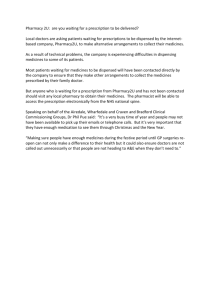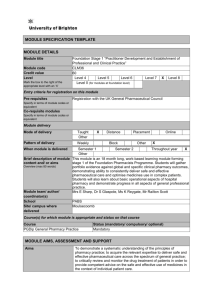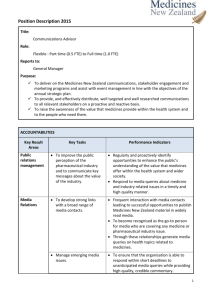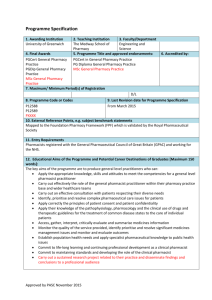Medway School of Pharmacy Diploma in
advertisement
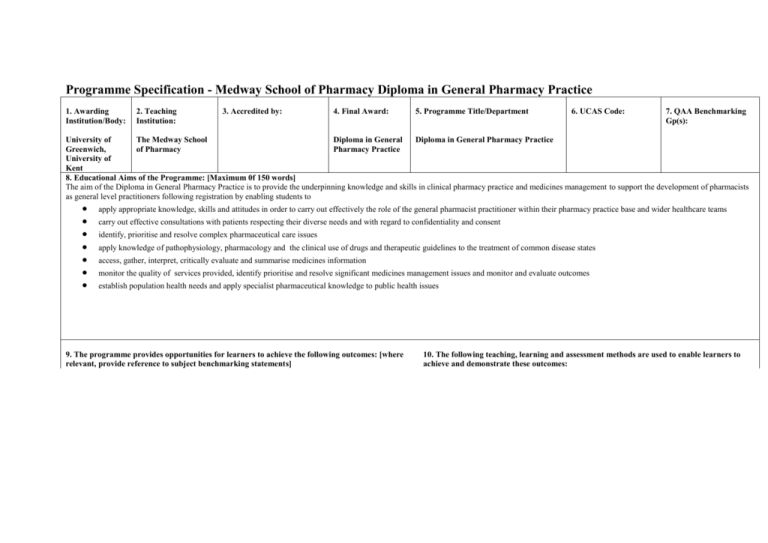
Programme Specification - Medway School of Pharmacy Diploma in General Pharmacy Practice 1. Awarding Institution/Body: 2. Teaching Institution: 3. Accredited by: 4. Final Award: 5. Programme Title/Department 6. UCAS Code: 7. QAA Benchmarking Gp(s): University of The Medway School Diploma in General Diploma in General Pharmacy Practice Greenwich, of Pharmacy Pharmacy Practice University of Kent 8. Educational Aims of the Programme: [Maximum 0f 150 words] The aim of the Diploma in General Pharmacy Practice is to provide the underpinning knowledge and skills in clinical pharmacy practice and medicines management to support the development of pharmacists as general level practitioners following registration by enabling students to apply appropriate knowledge, skills and attitudes in order to carry out effectively the role of the general pharmacist practitioner within their pharmacy practice base and wider healthcare teams carry out effective consultations with patients respecting their diverse needs and with regard to confidentiality and consent identify, prioritise and resolve complex pharmaceutical care issues apply knowledge of pathophysiology, pharmacology and the clinical use of drugs and therapeutic guidelines to the treatment of common disease states access, gather, interpret, critically evaluate and summarise medicines information monitor the quality of services provided, identify prioritise and resolve significant medicines management issues and monitor and evaluate outcomes establish population health needs and apply specialist pharmaceutical knowledge to public health issues 9. The programme provides opportunities for learners to achieve the following outcomes: [where relevant, provide reference to subject benchmarking statements] 10. The following teaching, learning and assessment methods are used to enable learners to achieve and demonstrate these outcomes: A Knowledge and understanding of: Organisation and structure of the NHS Health policy and its impact on working practices Medicines management and its application to individual patient care Effective methods of working with patients, health and non-health professionals Consultation methods and their applicability to patient care Compliance, adherence and concordance` Health beliefs: theories and models Advantages and limitations of different methods of communication in the context of medicines management Ethical issues influencing prescribing decisions Evidence-based approach to drug therapy decisions Application of pharmacokinetic and pharmacodynamic principles to individual patient care Systematic approach to the delivery of care to patients with complex needs Systematic approach to drug and therapy monitoring in patients with complex conditions Applied therapeutics Systematic approach to complex queries about medicines use Effective use of complex clinical data sets Pharmaceutical public health Clinical governance in the context of medicines management Audit as a tool to improve quality of patient care Change management as a tool to improve service provision Use of CPD as a tool for lifelong learning A Teaching and learning: Guided, self directed student learning is actively encouraged, supported by a range of resources including the library facilities at their practice base and/or Medway campus and the world wide web. Students will be expected to develop the skill of critical evaluation of literature, and appropriate evaluation and application of web-based information will facilitate development of this skill. Students will undertake experiential learning under the guidance of a practice tutor in an accredited work base with set objectives. Blended learning will be essential. Formal teaching will be minimal but may include tutorials given by expert pharmacists or clinicians. Students will participate in action learning sets under the guidance of an academic or practice -based facilitator to discuss evidence from their professional development portfolio. Students will have access to formative case studies intended to assist them in applying theoretical knowledge in the context of the care of patients. A Assessment Methods: The assessment methods associated with each course are given in the course specifications. A variety of assessment methods are used to test the clinical knowledge, skills and attitudes of the practitioners, including objective structured clinical examinations, multiple choice questions, project work, compilation of a portfolio to demonstrate competency attainments. One of the key characteristics of assessment within the programme is the element of negotiation. This allows students to construct their own evidence of achievement of key learning outcomes under the guidance of an accredited practice tutor using experiences from their chosen area of clinical practice and application of their knowledge and skills to the care of actual patients. B Intellectual skills: Work independently, efficiently and professionally within current NHS frameworks and the RPSGB code of ethics and professional conduct, managing any conflicting priorities Demonstrate appropriate initiative whilst recognising personal and professional limitations Communicate clearly, precisely and appropriately with patients and all other healthcare professionals Recognise, value and use appropriate theories, concepts and principles from a range of disciplines Demonstrate effective application of patient confidentiality and the principles of patient consent Retrieve and document information in a clear and structured way Carry out effective consultations with patients and carers to encourage compliance Accept responsibility for own actions and for the care of patients assigned to his/her care Undertake a structured approach to problem solving, forming an appropriate judgement even in the absence of complete data Review, evaluate critically and synthesise sources of information and research methodologies cited in published literature to support the care of individual patients Accept responsibility for his/her own lifelong learning and continuing professional development Apply effective negotiating and influencing skills in order to achieve a definite outcome Assess the outcome of personal contributions to patient care Evaluate and discuss legal and ethical influences related to the pharmaceutical care of individuals Contribute to the improvement of healthcare outcomes through reflective practice and innovation B Teaching and learning Intellectual skills are developed through reflective practice and learning activities. Participation in case presentations and case study analysis will necessitate critical appraisal of the literature and provide opportunities for peer review, critical discussion and reflective learning. There is an opportunity for students to design and execute small-scale audits within the workplace for inclusion in their portfolio that will enable them to demonstrate higher order intellectual skills and attributes, as well as key practical and transferable skills. B Assessment Methods Methods used to assess intellectual skills include intensive workshops during study days, oral presentations, case study analysis, and portfolio entries, all set within the context of practice based reflective learning. C Subject Practical skills Apply the principles of medicines management and pharmaceutical care in practice Interpret prescriptions for medicines and evaluate for safety, quality, efficacy, legality and economy Advise patients, carers and healthcare professionals about medicines usage and health promotion Identify, prioritise, analyse, evaluate and resolve pharmaceutical care issues (including social issues) related to real patients irrespective of complexity Perform complex pharmaceutical calculations in order to advise on safe drug administration Demonstrate respect for the patient irrespective of ethnic, cultural or religious background Carry out the role of the clinical pharmacist effectively within the multidisciplinary healthcare team Carry out a review of patients’ medication at a range of levels, document recommendations and influence prescribers and patients appropriately to institute agreed changes Apply a knowledge of the pharmacology of drugs, pathophysiology of disease states and evidence-based treatment guidelines in the context of individual patients Select a range of biochemical, haematological, microbiological and near-patient tests in order to monitor efficacy and toxicity of drug therapy Conduct an analysis of a patient safety issue, evaluate options and draw an appropriate conclusion Investigate medicines information enquiries using an appropriate research strategy, and formulate and communicate responses to queries in a timely manner Advise on the clinical significance of drug-drug, drug-patient and drug-disease interactions and devise a course of action to minimise risk to the patient Investigate medicines information enquiries using appropriate evidence and formulate a response appropriate to the needs of the enquirer Advise on risk management issues and ways to minimise error Respond to symptoms and counter prescribe medication for patients with minor ailments Develop the pharmaceutical service and apply change management techniques Conduct a clinical audit, evaluate the outcome and make recommendations for change C Teaching and learning Subject practical skills will be developed in a co-ordinated manner throughout the programme. These skills are highlighted through the practical sessions as part of the study days.. Investigations will be carried out as part of the work-based assignments. C Assessment Methods: A variety of assessment methods are used to assess subject practical skills. The reflective portfolio is a vital component in the assessment of the skills required and will include reflection upon practice within the workplace and reflection upon communication skills in practice. Assessed tasks include a prescribing audit, a literature review of an area of prescribing or a therapeutic dilemma and a critical review of an aspect of the pharmaceutical service provided in the work-base. D Transferable/ key skills: Effective written and verbal communication with academic tutors, peers, practice tutors, patients, carers and the multi-disciplinary healthcare team Interpersonal skills: the ability to interact with patients, the public and other health and social care professionals Critical appraisal and summation of information from a variety of sources Interpretation of the significance of general, biological and medical statistics The ability to make appropriate decisions based on available information, with insight into the risks and benefits that may result from working with incomplete data Ability to work independently and as part of a team within professional codes of practice and conduct, with recognition of the moral and ethical issues related to medicines management issues Positive attitude and constructive approach to group discussions Reflective practitioner and autonomous learner with the ability to take responsibility for academic, professional and personal development High level information technology skills Time management and organizational skills High level problem solving skills D Teaching and learning The portfolio of evidence, the opportunity to work with pharmacists from different practice backgrounds, and the practical placements within the multi-disciplinary team will all provide students with an excellent foundation for CPD in their future careers as clinical pharmacists. D Assessment Methods: A variety of assessment methods are used to assess transferable key skills. The emphasis throughout the course on the development of transferable skills will ensure that these outcomes are met in master’s level graduates. Communication skills will be demonstrated with patients, peers, tutors and in the work-base. Different methods of communicating results are encouraged including creating of an abstract, a poster presentation, short dissertations, an oral presentation and oral discussion of a patient’s case with an assessor. IT competence will be demonstrated through investigation of medicines information queries and presentation of written responses, presentation of the practice portfolio, the use of the world wide web and the analysis and presentation of audit data The ability to solve problems, communicate appropriately and work with others will be demonstrated though the competence framework assessments. Self-directed learning and CPD will be demonstrated through the reflective portfolio 11 Programme Structure, Levels, Modules and Credits 12 Awards, Credits and Progression of Learning Outcomes (shown in Field 9) The PgCert/Diploma General Pharmacy Practice is only offered in the part-time mode. Students must pass the requirements for the award of PgCert to progress to Diploma level Compulsory Stage 2 Medicines Management in Practice (60 credits) Compulsory Stage 1 Developing the Practitioner (30 credits) Developing Clinical Practice (30 credits) PgDip 120 credits at M level Pass: Minimum of 50% overall on marked assignments plus satisfactory portfolio assessment Distinction: 70% overall on marked assignments plus satisfactory portfolio assessment PgCert 60 credits at M level Pass: Minimum of 50% on marked assignments plus satisfactory portfolio assessment Distinction : 70% and over on marked assignments plus satisfactory portfolio assessment

